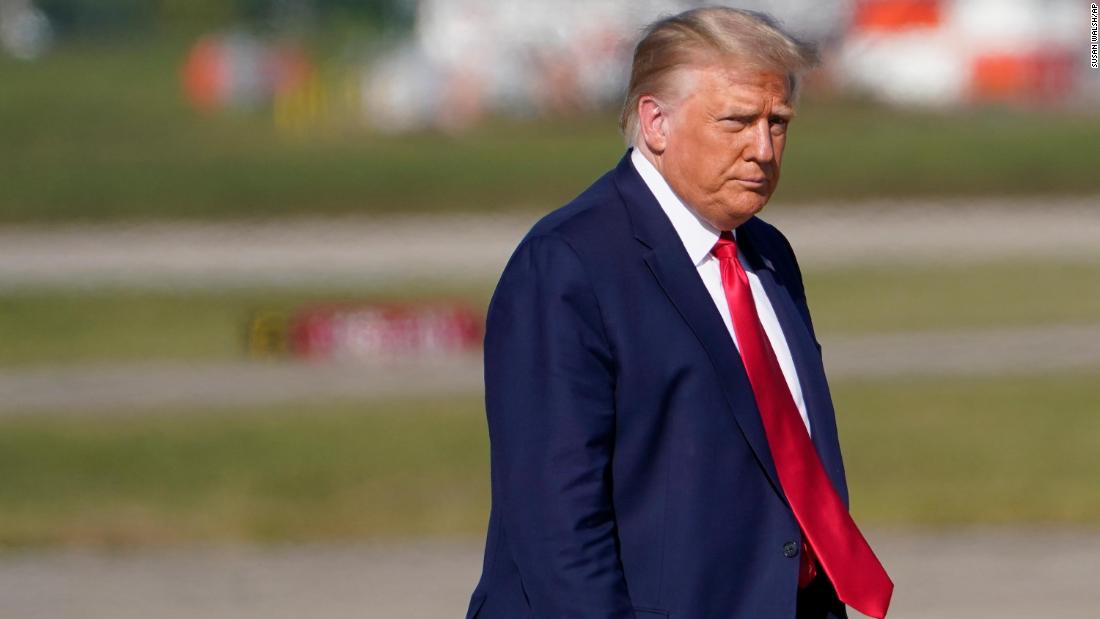
The speech included some important false and misleading claims about jobs.
Manufacturing
Trump claimed that "we brought back 700,000" manufacturing jobs.
Facts First: This was not even true before the pandemic-driven recession: as of February, 483,000 manufacturing jobs had been added during Trump's presidency. As of the most recent data, from August, 237,000 manufacturing jobs had been lost under Trump.[1]
After denouncing Biden for the Obama administration's efforts to reduce the use of coal, Trump said, "I saved it. I put our miners back to work."
Facts First: As of August, 5,300 coal mining jobs had been lost under Trump. (As of February, it was a loss of 1,000.) And the industry generally continues to decline. Amid a continued shift by utility companies toward cheaper natural gas and cleaner renewables, US coal production fell in 2019 to the lowest level since 1978, when there was a major strike. Multiple coal companies have filed for bankruptcy in 2019 and 2020.[2][3][4][5][6][7]
Trump has, as promised, made policy moves[8] to try to help the coal industry; it's certainly possible for him to argue that he has been better for the industry than a Democrat would be, and it's possible that his efforts have helped some miners get new jobs. But he has not come close to producing any kind of coal revival. The government's Energy Information Administration reported[9] in May that 2019 was the first year since the 1880s that the US consumed more energy from renewable sources than from coal.
Brian Lego, a West Virginia University research assistant professor who follows the coal industry, said conditions in the industry started to recover in 2016, prior to Trump's election, then were "relatively stable" from 2017 into 2019. But he emphasized that "it was stable at very low levels," and stable because of rising demand from foreign countries "rather than any discernible improvement in domestic coal demand linked to a change in US policy."
Conditions then worsened in late 2019 -- "The last four months or so of the year are when market conditions really fell apart, and the fourth quarter was terrible," Lego said -- and got even more dire because of the pandemic.
Washing machines
Trump claimed that Samsung and LG decided to build US factories because of the tariffs he put on washing machines imported from abroad.
"I put the tariff, and now what they're doing is LG and Samsung, and these companies that made the washing machine, they're now coming into the United States. And in order to avoid the tariff, they're building plants in the United States. And that's OK. And that's what we should be doing," he said.
Facts First: This is misleading. The Samsung and LG US washing machine factories were both announced in 2017, months before Trump announced the tariffs in 2018. LG says the tariffs prompted the company to make a larger investment in the plant than it initially planned, but that the tariffs were not the reason it decided to build the plant at all.[10][11]
John Taylor, spokesman for LG Electronics USA, said the company first decided to build a US washing machine plant in 2011, then took years to choose a Tennessee site, which it announced in February 2017. "We decided long ago. We announced the factory. A year later, after we announced the factory, there were some tariffs," he said.
He said the tariffs were one of the reasons the company ended up investing $360 million in the plant rather than $250 million.
"LG didn't build the factory because of the tariffs, but the tariffs were one of the factors that compelled us to accelerate the construction and invest more," he said.
So Trump could boast about how his policy led to additional investment -- though research has found[12] that the tariffs also led to price increases for consumers -- but it's "misleading, at best" to suggest the plants exist because of the tariffs, said Scott Lincicome, a trade expert and senior fellow in economic studies at the libertarian Cato Institute.
Samsung did not respond to a request for comment.
The pandemic recovery
Trump again boasted of setting records for job creation.
"In the past four months, we've added a record-smashing 10.6 million jobs -- never been close to that. Four months, 10.6 million jobs," he said.
Facts First: Trump left out essential context. Immediately before this record gain of about 10.6 million jobs over four months, there was a much larger record loss of about 22.2 million jobs over two months. In other words, as of August, the country was still down 11.5 million jobs since March. (And as of August, the economy was down 4.7 million jobs since the beginning of Trump's presidency.)[13]
References
- ^ 483,000 (fred.stlouisfed.org)
- ^ lost (fred.stlouisfed.org)
- ^ continues to decline (www.wsj.com)
- ^ shift (www.cnn.com)
- ^ lowest level since 1978 (www.eia.gov)
- ^ in 2019 (www.cnbc.com)
- ^ 2020 (www.theguardian.com)
- ^ moves (www.cnn.com)
- ^ reported (www.eia.gov)
- ^ Samsung (www.thestate.com)
- ^ announced the tariffs in 2018 (www.nytimes.com)
- ^ found (www.washingtonpost.com)
- ^ Immediately before (data.bls.gov)
- ^ returning (www.cnn.com)
from CNN.com - RSS Channel - HP Hero https://ift.tt/3kOoiLn
Post a Comment
Post a Comment